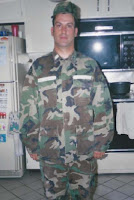A twitter conversation has led me to think about my academic journey
When I finished grad school in San Diego, I had no idea where I would end up.
Our first stop was Burlington, Vermont for two years of visiting prof-ing. I took that job hoping to cash it in and get one of the two tenure track lines there, but it didn't work out. Looking back, I am glad it worked out as it did, even though it meant teaching at a place for a second year after being told in year one they didn't want to hire me for the long-term. Awkward indeed. But
I learned how to teach, and their students were great. And I improved my skiing ability and got my wife into skiing. Plus our dog was most welcome in a community filled with large female dogs--his, um, preferred companions.
 |
If I had a blog at the time, I might have
referred to her as ER-adjacent Spew. |
Our second stop was Lubbock, Texas, where I was technically employed for seven years although we lived their for six. This is where Baby Spew was born, which was handy since the ER was close by, and we visited it often.
I learned how to publish there (I had only one or two pubs before this job), and I learned how to teach large classes, which became pretty important at the next stop. And we made friends with a great group of folks who all moved on. While I was itching to get out as soon as we arrived, and I spent too much time on the job market before my record really changed very much, it turned out to be a good experience in retrospect. It was a good place to get a lot of research done--a good teaching load, short commute, few students asking much of my time. But the best part of that place--my friends--was the most temporary, as the department turned over quite a bit.
 |
No, I didn't wear a uniform
in the Pentagon. I just dressed
up like this as a prank
for a retiring colonel/boss. |
Our next stop was Washington, DC for a fellowship that put me in the Pentagon. This year stressed Mrs. Spew as I was hardly around (I left at 5am, returned around 7pm each day), the landlord was suboptimal, and, yeah, the building I worked in got attacked a couple of times (9/11, anthrax). But it was a great year for me. I drank from the firehose--learning so much about how the US military works and how the interagency works. I went there to see the sausage get made, and did I! Plus
it bred questions that have driven my research since then--the NATO book and now legislative oversight. I went there as an ethnic conflict specialist--the folks in the Balkan policy pit called me
The Irredentist--and left seriously interested in civil-military relations.
 |
Got to play with my daughter from
time to time in Montreal. |
Which led to Montreal and McGill. The transition to another country and especially Quebec was more challenging than we expected--importing one of our cars ate about eight Thursdays my first semester. But Montreal had the best ultimate frisbee community of my life (Ottawa is close, but I feel like I moved here too late to fit in), great skiing nearby, amazing food, and, um, interesting politics.
McGill provided a great place to be challenged by super-smart, engaged students at all levels, and to learn much from sharp younger colleagues. One consistency in my career is that the folks hired after me at each place have been so very sharp (yes, this is an implicit dig at the old farts at the non-Carleton places. Ok, not so implicit).
 |
My colleague, Steph, drafted me to
speak to her class this fall on alliance stuff |
And now Ottawa and Carleton.
Being in a national capital is great for someone who studies International Relations. As I have been more and more interested in engaging the policy community, it helps to be there. I learn a lot from folks I meet at events, at parties, at bars, etc. It has definitely facilitated my efforts to build the CDSN. It is also the first place I moved to where I knew people ahead of time, so it felt really welcome. NPSIA and Carleton have been terrific to me, supporting my various efforts and recognizing me when I do good stuff. Oh, and the frisbee fields are the softest, most convenient that I have experienced. Older bodies need softer fields.
Throughout my career, I have wanted to move on from wherever I was at. What will make the 2020s different from the prior decades of my career is this: I will not be on the job market. I have now gone about eight years without having to think about the next place. I am now of an age and of a job status that it is very, very unlikely that anyone would hire me--I am too old, too expensive, and too entitled (I am addicted to my endowed chair). Oh, and I am too happy.
I am well aware that I am much closer to the end of my career than the beginning, but I am ok with that. The ride has been bumpy along the way, and things never turned out as I expected. So much for walking from my house to my classroom in a liberal arts college. Instead, I have had amazing opportunities to see much of the world, to shift research agendas, to teach entirely different types of students (undergrads to PhD students to policy-oriented MA students).
Sure, I couldn't control where I did my stuff, but I can control what I do and how I do it. The academic career, if one manages to get on the tenure track, can be a great ride, and it has been for me.







